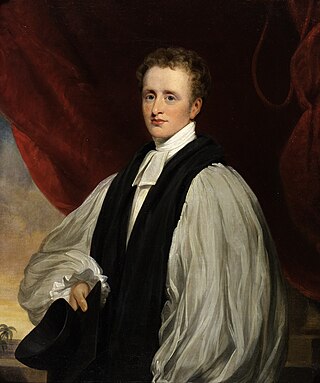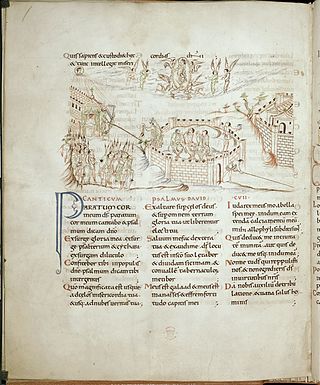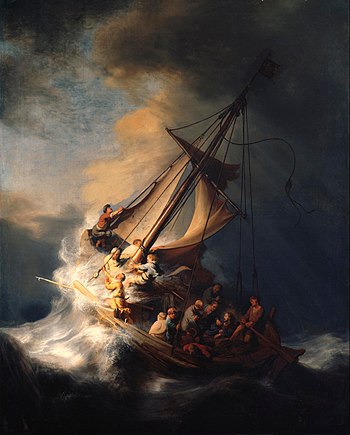A doxology is a short hymn of praises to God in various forms of Christian worship, often added to the end of canticles, psalms, and hymns. The tradition derives from a similar practice in the Jewish synagogue, where some version of the Kaddish serves to terminate each section of the service.

"Be Thou My Vision" is a traditional Christian hymn of Irish origin. The words are based on a Middle Irish poem that has traditionally been attributed to Dallán Forgaill.

"For All the Saints" was written as a processional hymn by William Walsham How, who was ultimately the Anglican Bishop of Wakefield. The hymn was first printed in Hymns for Saints' Days, and Other Hymns, by Earl Nelson, 1864.
William Whiting was an English writer and hymnist, best known for his 1860 hymn "Eternal Father, Strong to Save".

"We Gather Together" is a Christian hymn of Dutch origin written in 1597 by Adrianus Valerius as "Wilt heden nu treden" to celebrate the Dutch victory over Spanish forces in the Battle of Turnhout. It was originally set to a Dutch folk tune. In the United States, it is popularly associated with Thanksgiving Day and is often sung at family meals and at religious services on that day.

"Recessional" is a poem by Rudyard Kipling. It was composed for the Diamond Jubilee of Queen Victoria, in 1897.

"Dear Lord and Father of Mankind" is a hymn with words taken from a longer poem, "The Brewing of Soma" by American Quaker poet John Greenleaf Whittier. The adaptation was made by Garrett Horder in his 1884 Congregational Hymns.
"For the Beauty of the Earth" is a Christian hymn by Folliott S. Pierpoint (1835-1917).

"Holy, Holy, Holy! Lord God Almighty!" is a Christian hymn written by the Anglican bishop Reginald Heber (1783–1826).

Psalm 108 is the 108th psalm in the Book of Psalms. It is a hymn psalm, beginning in English in the King James Version: "O God, my heart is fixed; I will sing and give praise, even with my glory". In the slightly different numbering system used in the Greek Septuagint version of the bible, and in the Latin Vulgate, this psalm is Psalm 107. In Latin, it is known as "Paratum cor meum Deus". It is attributed to David.

Psalm 30 is the 30th psalm of the Book of Psalms, beginning in English in the King James Version: "I will extol thee, O LORD; for thou hast lifted me up". The Book of Psalms is part of the third section of the Hebrew Bible, and a book of the Christian Old Testament. In the slightly different numbering system used in the Greek Septuagint version of the Bible and in the Latin Vulgate, this psalm is Psalm 29. In Latin, it is known as "Exaltabo te Domine". It is a psalm of thanksgiving, traditionally ascribed to David upon the building of his own royal palace.

"The Hymn of Joy" is a poem written by Henry van Dyke in 1907 in being a Vocal Version of the famous "Ode to Joy" melody of the final movement of Ludwig van Beethoven's final symphony, Symphony No. 9.
Long metre or long measure, abbreviated as L.M. or LM, is a poetic metre consisting of four line stanzas, or quatrains, in iambic tetrameter with alternate rhyme pattern ABAB. The term is also used in the closely related area of hymn metres. When the poem is used as a sung hymn, the metre of the text is denoted by the syllable count of each line; for long metre, the count is denoted by 8.8.8.8, 88.88, or 88 88, depending on style.
"Faith of our Fathers" is a Catholic hymn, written in 1849 by Frederick William Faber in memory of the Catholic Martyrs from the time of the establishment of the Church of England by Henry VIII and Elizabeth. Faber wrote two versions of the hymn: one with seven stanzas for Ireland, and another with four for England. The Irish version was sung at hurling matches until the 1960s.
"Come Thou Almighty King" is a Christian hymn of unknown authorship, which is often attributed to Charles Wesley.

"Glorious Things of Thee Are Spoken", also called "Zion, or the City of God", is an 18th-century English hymn written by John Newton, who also wrote the hymn "Amazing Grace". Shape note composer Alexander Johnson set it to his tune "Jefferson" in 1818, and as such it has remained in shape note collections such as the Sacred Harp ever since. However, the hymn is most often set to the tune of Joseph Haydn's "Gott erhalte Franz den Kaiser". In recent decades it has been sometimes replaced by "Abbot's Leigh". This was written for this text by Cyril Vincent Taylor in 1942 while he was a producer of Religious Broadcasting at the BBC and stationed at the village of Abbots Leigh. Multiple other tunes have also been used with the hymn.
"Crown Him with Many Crowns" is an 1851 hymn with lyrics written by Matthew Bridges and Godfrey Thring and sung to the tune 'Diademata' by Sir George Job Elvey. The hymn appears in many hymnals.

"Allein Gott in der Höh sei Ehr" is an early Lutheran hymn, with text and melody attributed to Nikolaus Decius. With the reformers intending church service in German, it was intended as a German version of the Gloria part of the Latin mass, used in almost every service. Decius wrote three stanzas, probably in 1523, while a fourth was added, probably by Joachim Slüter.
"The Strife is O'er, the Battle Done" is a Christian hymn that is traditionally sung at Easter to celebrate the Resurrection of Jesus. It was originally a 17th-century Latin hymn, "Finita iam sunt proelia"; the popular English-language version is an 1861 translation by the English hymnwriter Francis Pott.
"Thy Strong Word did Cleave the Darkness" is a Lutheran hymn written by Martin H. Franzmann and set to the tune of Ebenezer by Thomas John Williams.














